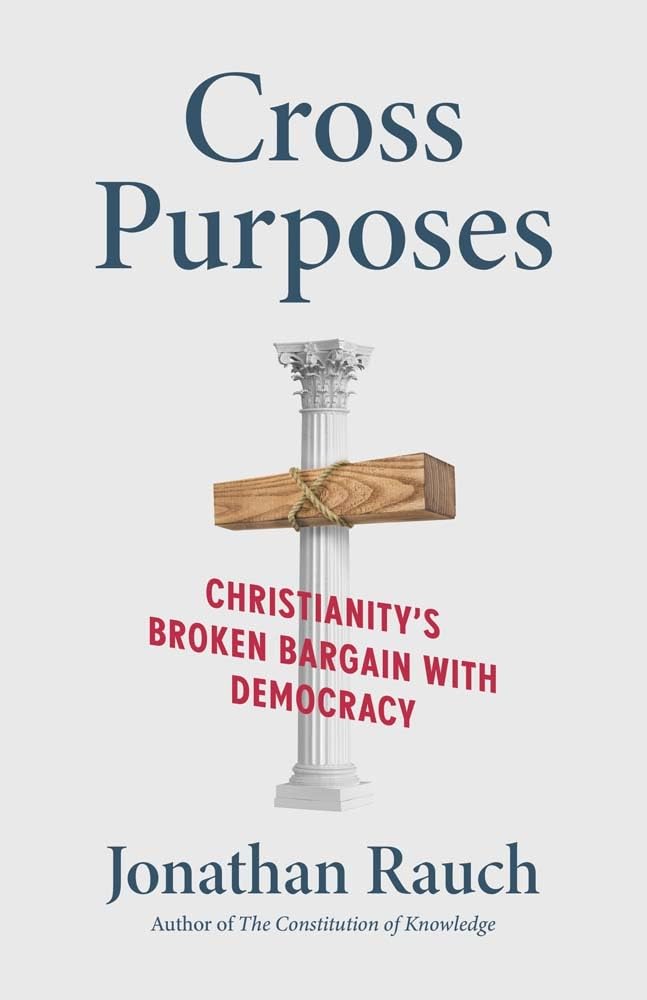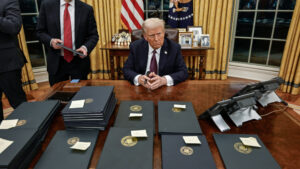Some have called our time the “late-modern” era. We’re living in the twilight of modernism: that great cultural and political movement that birthed the Industrial Revolution, the scientific revolution, and free-market capitalism.
The modern era’s political philosophy is liberalism. Not “liberal” as in left vs. right; “liberal” as in liberty. Freedom, independence, and individual rights are some of its central tenets. Kant, Locke, and Rousseau are some of its seminal thinkers. Madison, Jefferson, and Hamilton put its ideas to work in the American founding.
But the question now is whether liberalism is dying. Patrick Deneen sounded its death knell in his 2018 book Why Liberalism Failed [read TGC’s review]. He argued that by maximizing individual freedom, liberalism has dissolved social bonds and destroyed cultural solidarity. Many others have made similar claims. Post-liberal critics assert that whatever comes next, it’s certainly not a return to the good old liberalism of America’s Founding Fathers. The ship known as political liberalism is taking on water. It’s only a matter of time until it sinks under the sea of history.
Jonathan Rauch, a senior fellow at the Brookings Institution, contests this claim. He thinks the boat can be repaired. He wants to renew, rebuild, and revitalize classical liberalism. In his book Cross Purposes: Christianity’s Broken Bargain with Democracy, he highlights the good that liberalism has brought to the world: the emphasis on individual rights, the end of religious wars and persecution, the flourishing of economic prosperity and scientific inquiry. He tackles the post-liberal critique head-on, arguing liberalism is not at fault for its own demise. In fact, Christianity is to blame!
Rauch argues that Christianity has “broken its bargain” with liberal democracy. And if Christians would recommit to the deal—liberalism providing the governing principles, Christianity providing the moral and spiritual backbone—American democracy could flourish once again. “It is important for Christianity and democracy to be reasonably well aligned. Neither can thrive if they are at cross purposes” (21).
Assuming his readers agree that “Christianity and democracy [must be] reasonably well aligned,” Rauch’s solution is for Christianity to come into proper alignment. Liberalism sets the terms; Christianity responds. And this is the fatal flaw not only in Rauch’s argument but in liberalism itself. Under the guise of neutrality, liberalism smuggles in its own set of moral imperatives. And that—not Christianity’s “broken bargain”—is what’s fracturing the American republic.

Cross Purposes: Christianity's Broken Bargain with Democracy
Jonathan Rauch
Cross Purposes: Christianity's Broken Bargain with Democracy
Jonathan Rauch
Jonathan Rauch—a lifelong atheist—reckons candidly with both the shortcomings of secularism and the corrosion of Christianity. Thin Christianity, as Rauch calls the mainline church, has been unable to inspire and retain believers. Worse, a Church of Fear has distorted white evangelicalism in ways that violate the tenets of both Jesus and James Madison. What to do? For answers, Rauch looks to a new generation of religious thinkers, as well as to the Church of Jesus Christ of Latter-day Saints, which has placed the Constitution at the heart of its spiritual teachings.
Liberalism’s Hidden Values
Classical liberals often claim liberalism is neutral; it doesn’t impose a definitive vision of the good. Rather, it provides a system of procedural norms that allows citizens to sort through their differences and arrive together at a common good. As Rauch puts it, “When differences arise, [liberal regimes] deploy public debate and open-ended, decentralized, rules-based processes” (12).
This is what we all love about American democracy. It’s the First Amendment, the Bill of Rights, the separation of powers. The American founders aimed to “secure the blessings of liberty for ourselves and our posterity,” and that liberty includes the freedom to worship as we wish, speak as we wish, and live as we wish, so long as we don’t trample on others’ rights. Procedural liberalism is a great system. “In a modern country of 350 million very different people, political and moral disagreement is intrinsic, and some version of liberalism—in our case, James Madison’s—is the only system which has proved capable of managing it” (48).
Perhaps so. But the only way liberalism can manage political and moral disagreement is by imposing its own moral vision. As Rauch observes,
Liberalism claims to be neutral only with respect to state procedures such as laws and elections. There is nothing “neutral” about its values, such as its core precept that all people are born free and equal. If that precept is the “image” in which liberalism “surreptitiously remakes the world,” I’ll gladly take it. (48)
Liberalism, it turns out, does have values. It does have a substantive vision of the good. And it does seek to remake the world in light of those values.
Liberalism, it turns out, does have values. And it does seek to remake the world in light of those values.
Here, then, is the dilemma that confronts liberalism’s defenders: When we speak of liberalism, are we talking about a set of neutral democratic procedures that allow disparate groups to live together in harmony? Or are we talking about a morally freighted worldview that seeks to impose its own vision of the good?
On one page, Rauch commends liberalism because “everyone follows the same rules and enjoys the same rights” (12). A few pages later, he lauds liberalism’s “advance of enlightened secular values” (15). Defenders of liberalism must choose between these two options. If liberalism is a neutral system, it must remain agnostic with respect to values; if it espouses certain moral values, it’s no longer neutral.
By discerning this doublespeak about liberalism, we begin to understand why it inevitably conflicts with creedal Christianity.
Christianity is absolutely compatible with a neutral, procedural liberalism—in fact, Christendom birthed that political system. But Christianity isn’t entirely compatible with a secular, value-laden version of liberalism. Christianity hasn’t “broken its bargain” with democracy; Christianity never made any such bargain. Rather, late-stage liberalism arrogated to itself the right to dictate to Christians (and other people of faith) the terms on which we could bring our values into the public square. And what’s broken in American democracy is that a whole bunch of people are finally rejecting liberalism’s right to dictate those terms.
Resisting Liberalism’s Hegemony
Over the past eight years, the rejection of liberalism’s values has sometimes included support for Donald Trump. This, to Rauch, is beyond the pale. The entire second chapter of his book is dedicated to a takedown of “Sharp Christianity,” by which he means “white evangelical Christianity in its embrace of MAGA values” (73). Rauch envisions Trump as the grievance candidate of white evangelical Christians who have abandoned their convictions in pursuit of political favor and culture-war retribution. But on the heels of the 2024 election, this analysis falls flat.
It certainly wasn’t “white evangelicals” who put Trump in office a second time; it was a multicultural, multigenerational coalition of voters disillusioned with key aspects of late-stage liberal society. “Modern liberal societies rely on three linked social systems,” Rauch writes: “liberal democracy to make political choices; market capitalism to make economic choices; and science . . . to make epistemic choices” (12).
In recent years, all three of these social systems have revealed their captivity to secular and progressive values. During the COVID-19 pandemic, political leaders prevented citizens from gathering for worship but allowed protest demonstrations in the streets. The largest tech companies in America colluded with government agencies to silence “disinformation” in the name of “protecting democracy.” And the authority of science was invoked to force lockdowns on a skeptical and recalcitrant population.
“A hallmark of liberal social systems is that the same rules apply to all, regardless of identity or tribe,” Rauch writes (12). It seems an increasing number of Americans are concluding that the same rules don’t apply to all. Citizens who espouse progressive orthodoxies are favored; those who dissent are ostracized. Liberalism, it turns out, is just a different kind of religion. Many American citizens are rejecting that religion.
Rauch’s blindness to liberalism’s dogmatic orientation makes Cross Purposes difficult to read. His critiques of Christianity aren’t illegitimate, and his insights often have merit. But as he lectures Christians on how to better practice their religion, he seems totally unaware of his own. The familiar bogeymen are there: “white evangelical America,” Christian nationalists, culture warriors, Trump voters. What’s lacking is meaningful engagement with historic Christian political theology or good-faith curiosity about why some American Christians would embrace Trump.
Vision for Latter-Day Liberalism
In his final chapter, Rauch turns to the Mormon (LDS) church to make his case for what American Christianity could be. The Mormons, he argues, have made peace with homosexuality and gay marriage—not in their doctrine but in their social policy. He speculates,
So why might [someone compromise] . . . on LGBT rights, despite believing that homosexual behavior violates God’s law? Why might the [LDS] church support the Utah compromise and the Respect for Marriage Act? Because those measures protect the church’s ability to teach and practice its doctrines about marriage and sexuality within its own institutions, while also protecting, in the larger society, people’s ability to make their own choices about marriage and sexuality. (116–17)
This, it turns out, is the only “bargain” liberalism offers: Religious values will be tolerated within religious institutions, so long as liberalism’s values (“people’s ability to make their own choices”) reign unchallenged in the larger society. It’s unsurprising that religious Americans seem less and less inclined to accept this bargain. If Christianity and liberalism are at cross purposes with one another, it’s not because Christianity has become illiberal. It’s because liberalism has shown itself to be a religion, and its core doctrines are finally being challenged.
As Rauch lectures Christians on how to better practice their religion, he seems totally unaware of his own.
Rauch’s book comes so close. So close to correctly diagnosing the problem with our ailing late-modern democracy. So close to understanding American evangelicalism’s fracturing. So close to making a cogent defense of classical liberalism. Instead, he reveals once again why classical liberalism can’t (and won’t) be revived. Cross Purposes may win him a slate of podcast interviews and a favorable review in The New York Times. But beyond that, it’s unlikely to win many converts.
“The Most Practical and Engaging Book on Christian Living Apart from the Bible”
 “If you’re going to read just one book on Christian living and how the gospel can be applied in your life, let this be your book.”—Elisa dos Santos, Amazon reviewer.
“If you’re going to read just one book on Christian living and how the gospel can be applied in your life, let this be your book.”—Elisa dos Santos, Amazon reviewer.
In this book, seasoned church planter Jeff Vanderstelt argues that you need to become “gospel fluent”—to think about your life through the truth of the gospel and rehearse it to yourself and others.
We’re delighted to offer the Gospel Fluency: Speaking the Truths of Jesus into the Everyday Stuff of Life ebook (Crossway) to you for FREE today. Click this link to get instant access to a resource that will help you apply the gospel more confidently to every area of your life.

































